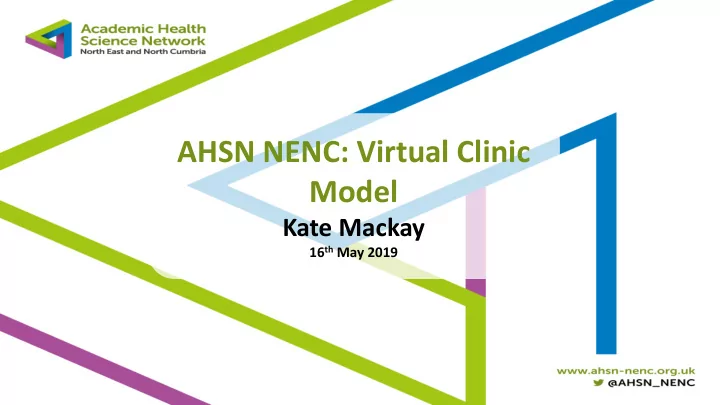

AHSN NENC: Virtual Clinic Model Kate Mackay 16 th May 2019
Protect – The AF ‘Virtual Clinic’ Model • According to 2017/18 QOF data there have been improvements in the anticoagulation rate for these patients on a national level (from 81% in 16/17 to 84% in 17/18). • However, there still remains 147,557 people who are at risk of stroke and are not receiving anticoagulation therapy. • 20% of strokes are caused by AF, and AF strokes are more likely to be fatal or result in long-standing disability. • The ‘AF virtual clinic’ model aims to improve anticoagulation rates in those people who have a diagnosis of AF and who are at risk of a stroke (CHA2DS2VASc of >2).
The AF ‘Virtual Clinic’ model • Bring specialist skills into general practice: • Anticoagulation pharmacists (nurses, haematologists) • Simple process: practice to identify all patients on AF register not currently anticoagulated and collate relevant data: • CHA 2 DS 2 VASc and HASBLED; • Treatment to date (why not currently anticoagulated); • Any other relevant information. • Virtual clinic with GPs to discuss anticoagulant options and agree management plan for each patient. • GP practice to implement patient management plans and report outcomes to receive incentive scheme payment.
Outcomes for Lambeth & Southwark Across 92 GP practices, 1,574 patients with AF not currently receiving anticoagulation were reviewed over 12 months: • 1,292 additional patients anticoagulated – Lambeth CCG: 567 additional patients anticoagulated – Southwark CCG: 725 additional patients anticoagulated • Preventing an estimated 45 strokes a year. • 25% reduction in the rate of AF-related stroke across the two CCGs.
Other Advantages • Updated / educated primary care workforce – myths and misconceptions addressed. • Strengthened relationships between specialist a/c services and primary care. • Redesign of anticoagulant referral form across all three tertiary centres to ensure all necessary information was on referral. • Supported DOAC initiation in primary care for housebound and nursing home patient. • In-depth data on untreated population to guide further service developments.
GP Perspectives • “…helped me understand more about prescribing and monitoring the newer oral anticoagulants.” • “…huge help in patients where bleed risk and stroke risk are in the balance.” • “I feel more confident in anticoagulating my older patients – I have always worried about bleeding.” • “I understand stroke and bleeding risk scores better.” • “We have nominated a lead GP to review the AF register regularly to ensure all patients are managed appropriately.”
CCG Perspective • Supports GPs in making evidence based decisions about anticoagulation for their patients. • Made the anticoagulant referral process easy. • Promotes behavioural change. • Breaks down barriers between primary and secondary care. • Delivers care closer to home and reduces unnecessary referrals. • Affordable in local health economy.
NHSE-Funded Virtual Clinics • NHSE have provided funding for the pharmacist or specialist resource, GP incentive scheme and additional in-year DOAC costs. • 23 CCG areas identified across England. • In excess of 18,000 people treated, preventing around 700 strokes, saving an estimated 200 lives. • April 2019 – March 2020. • On the ground support from AHSNs.
Anticoagulation QOF Achievement (AF007) 2017/18 compared to 2020 Targets 100% % Achievement 84% Target 80% target 90% 80% % Achieved 70% 88.0% 87.7% 87.6% 87.5% 85.7% 85.7% 85.2% 84.9% 84.0% 84.3% 81.4% 80.8% 60% 79.3% 50% 40%
Virtual clinic discussions covered: • Most practice will have up to 20 patients not currently treated. • VC discussion will last 1 ½ - 2 hours. • Confirming a correct AF diagnosis. • Correct coding of AF on the GP system. • Correct use of stroke and bleeding risk scores. • Assessing benefits and risks of anticoagulation for complex patients – Dispelling myths and misconceptions • Explain benefits and risks of anticoagulation to patients. • Explaining the role of left atrial occlusion devices where anticoagulation is contraindicated.
Key requirements for the specialist practitioner • At least 2 years experience as a specialist in anticoagulation, working autonomously managing a caseload of patients, ideally as an independent prescriber. • Experience initiating and monitoring vitamin k antagonist oral anticoagulants and direct oral anticoagulants. • Comprehensive understanding of the evidence base relating to anticoagulation in atrial fibrillation. • Member of a broader multi-disciplinary anticoagulant team, including a haematologist, who will provide clinical advice on the management of complex patients, clinical supervision and supporting governance arrangements for this role. • Experience in providing anticoagulation related training for the wider healthcare team. • Able to challenge senior clinicians in relation to their current practice in anticoagulation.
Launch of AF Virtual Clinics • NHSE announcement on 7 th May - https://www.england.nhs.uk/2019/05/nhs-stroke-action-will-save- hundreds-of-lives/ • Siobhan Brown, Chief Operating Officer at Northumberland CCG, said: “……This scheme could prevent around 66 strokes, saving lives and helping people avoid severe long-term health problems. All 41 of our practices are taking part in the project, with support from the cardiologist at Northumbria Healthcare NHS Foundation Trust, to ensure we improve skills and processes wherever we can.”
Watch this space…..
Beyond Virtual Clinics • Education and training of GP practice staff. • Protected learning time events (PLTs). • Locality / federations meetings. • GP practice based pharmacists. • Managing housebound patients and those in nursing homes. • Ensuring the anticoagulation pathway is fit for purpose – no delays to initiation (referral to treatment < 2 weeks (NICE). • Addressing the quality and safety of a/c prescribing. • Supporting enhanced adherence to treatment.
Thank you for listening • Kate Mackay, AF Programme Lead, AHSN NENC Kate.Mackay@ahsn-nenc.org.uk
Recommend
More recommend